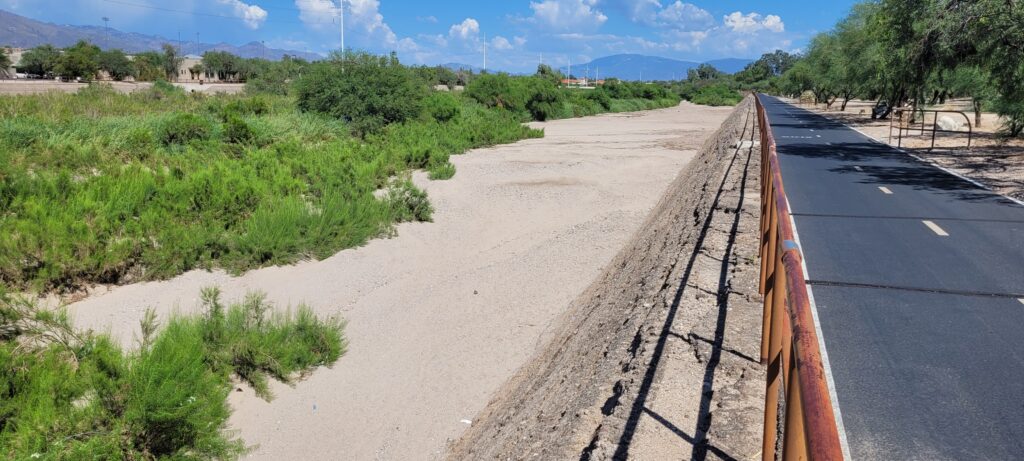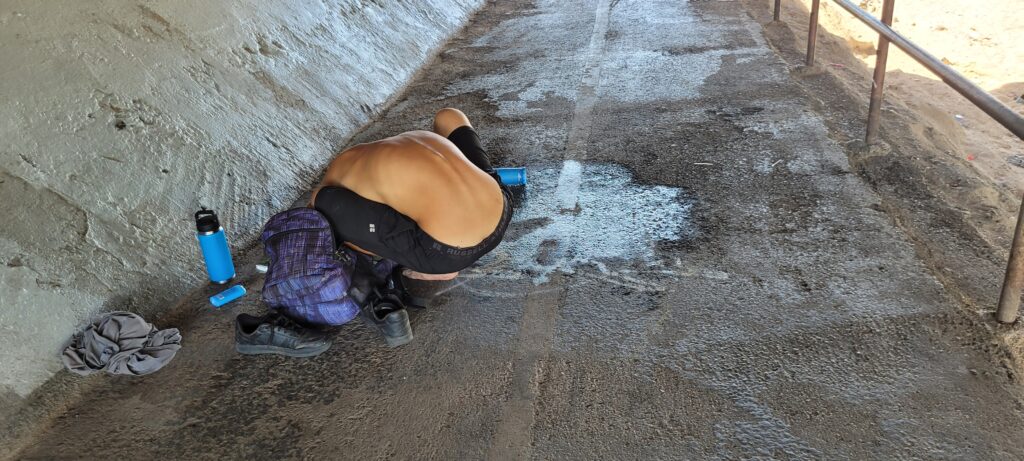The Rillito—a dry riverbed in Tucson. Civilization forced itself upon the desert and sucked the water table so low the rivers ran dry. There’s water underground, sure, but unless there’s enough rainfall to saturate the desert floor, Tucson’s rivers are just strips of sand and whatever has roots deep enough to sustain life. Lots of trees.
I was looking for Victor again. His phone no longer goes to voice mail, so time is suddenly a much stronger enemy. I had an idea that could get him out of the tunnel, but first I’d have to find him. The river was out of my way, but not horribly far. Besides, what else was I going to do? I parked under the same tree—the one that casts a shadow onto the parking lot behind the strip mall—and walked the bike path to where we’d met last week, but it was just too hot out. Most of the folks I knew were gone. Lots of new faces. Who was I kidding? The new face was mine.

Learning something new is no surprise—not anymore anyway. The only surprises are what I learn and from whom I learn it. This time, it was Tanisha. She reminded me that homelessness, for most of us, isn’t a choice; it’s the result of our choices. Like any other “position” in life, this can be just a temporary stage. The folks in the tunnel are rarely bitter. Choices were made. Predictable consequences followed. Good choices would have had better consequences, but no matter where you are on the socioeconomic ladder, you’re not permanently set in any position. Even the richest people on Earth can suddenly start making really bad decisions and start dropping levels. Even prison inmates can choose a path of self-improvement. Just the same, the poorest tunnel-dwellers can start making good decisions and start rising. Because of this truth, she teaches: everyone is your peer.
The only thing is, for most of us, our decision-making skills are pretty much set. That’s not to say recovery is impossible—any more than failure is impossible for someone who’s achieved success. The thing to note, here, is that you don’t come to live within a set of circumstances simply by choosing to be there. Instead, you have to choose to do certain things which result in your getting there, then you have to continue making the quality of choices which result in your remaining there. Knowing this, it’s easy to understand the phenomenon of homelessness. It will require a long series of smart choices to get out and stay out; and conversely, continuing to make the choices which predictably result in sleeping on a concrete slab beneath a busy roadway, well, you’d better get used to waking up stiff.

This is no way to sleep.
Tanisha also reminded me to try to avoid the term “end up,” as in, “How did you end up in the tunnel?” The term sounds defeating, like this is the end. Now, I’m no fan of today’s language Nazis who try to force people to desist from using certain words or phrases, despite being perfectly apropos, for fear of hurting someone’s feelings, but this kind of makes sense. Although “homeless” will sadly be the final status of most of these folks, some are determined to claw their way out, and any bit of encouragement they can get, or avoidance of discouragement, will only increase the likelihood of their success.
Her lesson: everything is temporary—the double entendre of the shoes you’re wearing, your favorite shirt, that comfy recliner, your car—they’ll all fade, and from their degradation comes the opportunity to improve. Your house should outlast you, true, and that only demonstrates that life itself is only temporary, and with loss, adjustments (changes) must be made.
As change is inevitable, so is opportunity thus ever-present. What a wonderful and inspiring outlook! At that, how could I not think of Heraclitus? A river’s flowing waters ensure its ever-changing existence. Truly, without water flowing at all, I found the Rillito River, thanks to Tanisha, profoundly different from the last time I’d stepped into it, proving Heraclitus right: no man ever steps in the same river twice, for it is not the same river, and he is not the same man.